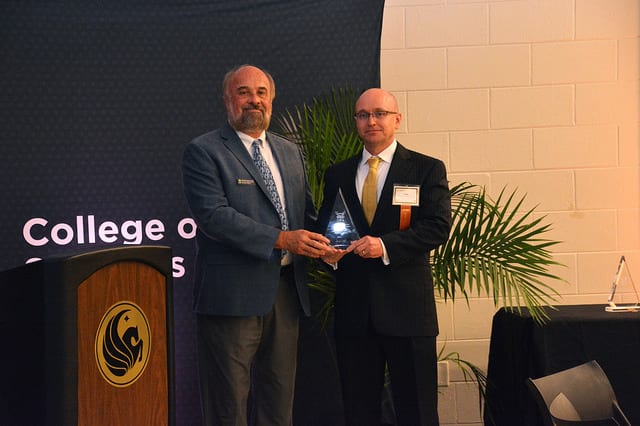Alumnus Focuses on Sustainable Agriculture

Biology Department Chair Graham Worthy presents the 2018 Outstanding AlumKnight Award to Clay Scherer.
Agriculture is a tricky business. With unpredictable weather patterns, soil degradation, threatening pests and limited land, farmers struggle to grow healthier, more productive and profitable crops. If farmers can’t grow crops, the number of people at risk of living in hunger increases.
Biology alumnus Clay Scherer, Ph.D., works to fix that problem. He develops products to eliminate public health threats like termites, cockroaches, flies, ants and mosquitos.
He’s the global technical manager of professional pest management at Syngenta, an agriculture business which emphasizes on sustainably feeding the world’s population. Working to support the United Nation’s Sustainable Development Goals, Syngenta tackles issues facing global food security. This is done through sustaining natural resources, building healthy ecosystems and helping rural communities thrive.
Scherer takes part in that mission by safely removing pests from fields, which allows crops to grow. These crops can then, in turn, feed the 2.5 billion people who depend on agriculture for a living. The farmers wouldn’t be able to do their jobs if Scherer didn’t do his.
“That’s really the point,” he said. “My most memorable moment on the job is the satisfaction after developing a new product for 5 to 10 years. Customers really appreciate it, and it helps their business.”
Maintaining a healthy and safe balance in the world’s ecosystems requires a lot of global collaboration.
“I have been on many, many campuses across the United States, and quite a few internationally, as part of collaborative research projects,” Scherer said. “I really enjoy discussions with other scientists and brainstorming or debating ideas. There are a lot of interesting people out there.”
He’s been helping to protect the environment since his time at UCF, nearly 30 years ago.
“My best memory is helping Dr. Henry Whittier and a group of fellow volunteers relocate about 20 needle palms from some swamp about 20 miles from campus to the UCF Arboretum,” he said. “For those who don’t know, they are called needle palms because they have rings of very long, rigid spikes around the base- making it very difficult to grab or hold to lift them.”
The palm trees were about 3 feet by 3 feet, which is a decent size considering the only equipment the group had was human manpower. Scherer and the crew had to dig the palms up from the middle of a swamp and drag them to the back of a pickup truck before transporting the trees to the Arboretum.
“It was a long, tough day,” Scherer said. “But it was a success.”
That wasn’t the only thing he took part in during his time at UCF. Scherer was also a member of a few different student organizations on campus, as well as part of one of the school newspapers. He also held a part-time job, and was a member of Alpha Tau Omega Fraternity.
“I would recommend all students find at least one campus organization to get involved in,” he said. “Balancing academics and classes with extracurricular activities can be tricky, but don’t underestimate the value of both. Gaining experience from various opportunities while you’re on campus also contributes to your college experience, and broadens your knowledge base and network. I found it incredibly valuable.”
Those experiences, coupled with his degree in biology, prepared Scherer to go forward with his education.
“I had great classes with really outstanding teachers and faculty who prepared me very well for graduate school,” he said. “I was really well prepared with a background in biology.”
He went on to get his doctorate degree in entomology, focused on studying pesticide use in urban environments. That led to his job at Syngenta in Switzerland, where he now acts as a defender of public health, helping to reduce pests and ultimately reduce food poverty.
